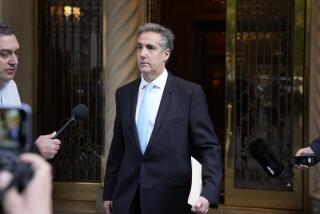Clinton Aide Denies Hiding Cash Reports
- Share via
LITTLE ROCK, Ark. — Senior White House aide Bruce Lindsey took the witness stand Tuesday to deny charges that he illegally hid cash withdrawals from President Clinton’s 1990 gubernatorial campaign bank account.
“No, sir, I did not,” Lindsey, Clinton’s most trusted aide for nearly two decades, said forcefully half a dozen times when asked if he had suggested to Arkansas bank officials that reports required by federal law be withheld from the Internal Revenue Service.
Lindsey, looking like a man fighting for his honor and reputation, leaned forward and peered intently at the jury as he testified for nearly five hours in the latest Whitewater trial.
Although Lindsey has not been charged, prosecutors who are trying Perry County Bank co-owners Herby Branscum Jr. and Robert M. Hill have designated him as an unindicted co-conspirator so that testimony about his alleged conversations could be introduced, according to defense attorneys.
Chief prosecutor W. Hickman Ewing Jr., who works for independent counsel Kenneth W. Starr, has told jurors that Lindsey was “a middleman” in the failure of Branscum and Hill to file currency transaction reports with the IRS after Lindsey withdrew $52,500 in cash as Clinton’s 1990 campaign treasurer.
The IRS requires banks to file reports on all cash deposits or withdrawals of $10,000 or more.
Lindsey, called as a defense witness, contradicted testimony by former Perry County bank president Neal T. Ainley, the prosecution’s star witness. Ainley has said that he did not file the required IRS reports because he knew, or was told by others, that Lindsey did not want them filed.
In a plea agreement with Starr’s office, Ainley won a reduced sentence of two years’ probation, a $1,000 fine and 416 hours of community service after pleading guilty to two misdemeanors. His credibility has been under steady attack by lawyers for Branscum and Hill.
Minutes after taking the witness stand, Lindsey, who is deputy White House counsel, was led through a series of questions by Dan Guthrie, Branscum’s attorney.
Question: Did you in any way conspire with Neal Ainley to have the Perry County Bank not file currency transaction reports?
Answer: No, sir, I did not.
Q: Did you conspire with Herby Branscum not to file reports?
A: No, absolutely.
Q: Did you conspire with Rob Hill?
A: No, sir, I had no such discussion with anyone at the bank. . . . There was none. There was no reason for any.
Lindsey acknowledged that on May 25, 1990, he withdrew $30,000 in cash from the campaign’s account at the bank by writing four checks for $7,500 each. He said that he did so out of “paranoia” that a bank clerk could discover a single $30,000 withdrawal and feed the information to political opponents, inspiring a charge that the Clinton campaign was trying to “buy votes” a few days before the primary election.
Asked why he needed so much cash, Lindsey said it was used for “get out the vote” activities, including paying college students to distribute literature, hiring persons to drive voters to the polls and buying meals for volunteers manning telephone banks.
“Did you care whether the Perry County Bank filed a currency transaction report?” Guthrie asked.
“No, sir, I did not,” Lindsey replied, declaring that he publicly disclosed the large withdrawal shortly after the primary in campaign reports filed with state and county authorities.
Lindsey’s testimony that he made “a full disclosure” of this cash withdrawal brought a sharp attack by Ewing, the prosecutor, who noted that Lindsey’s campaign reports had listed more than $30,000 spent on rallies, television, “booths and contributions.”
“Can you tell by looking at this how the money was spent?” Ewing demanded.
“Not precisely,” Lindsey answered. “We listed expenditures by category, as the law provides.”
On cross-examination, Ewing also showed that Lindsey had a vague memory on details of the $30,000 cash withdrawal--as well as on another $22,500 withdrawal--such as whom he had dealt with at the bank, where he had received the money and how large had been the stacks of $100 and $50 bills he had been given.
Besides charges that they concealed the $52,500 in cash withdrawals from the IRS, Branscum and Hill are also accused of conspiring to use their bank’s money to pay for contributions by themselves and others to Clinton and other Arkansas politicians.
Prosecutors have claimed that the two were trying to curry favor with Clinton, who appointed Branscum to the powerful state highway commission after his 1990 reelection and reappointed Hill to the state banking board.
Later this week jurors are expected to see videotaped testimony from Clinton in response to questions about those claims.
More to Read
Get the L.A. Times Politics newsletter
Deeply reported insights into legislation, politics and policy from Sacramento, Washington and beyond. In your inbox twice per week.
You may occasionally receive promotional content from the Los Angeles Times.









